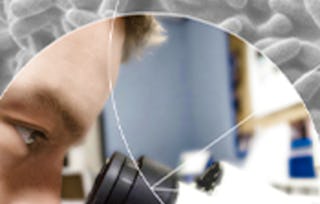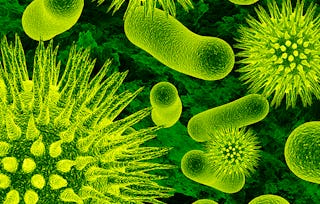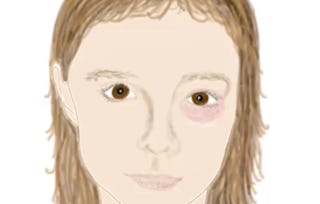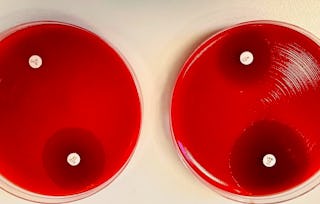Explore the fascinating microscopic world of bacteria, viruses, fungi, parasites, and prions that profoundly impact human health and disease. Learn evidence-based infection prevention strategies and antimicrobial stewardship principles essential for safe patient care and public health protection. Develop critical skills in microbial identification and infection control protocols fundamental to nursing practice.
即将结束: 只需 199 美元(原价 399 美元)即可通过 Coursera Plus 学习新技能。立即节省

Microbiology Foundations
包含在 中
您将学到什么
Classify and differentiate bacterial structures, including Gram-positive vs. Gram-negative characteristics and metabolic processes
Analyze viral biology, replication mechanisms, and the spectrum from pathogenic to beneficial viruses in human health
Identify eukaryotic microbes including pathogenic yeasts, molds, and parasitic organisms from protozoa to helminths
Evaluate prion biology and unique infectious mechanisms in neurological diseases like BSE and Creutzfeldt-Jakob disease
您将获得的技能
要了解的详细信息
了解顶级公司的员工如何掌握热门技能

积累 Basic Science 领域的专业知识
- 向行业专家学习新概念
- 获得对主题或工具的基础理解
- 通过实践项目培养工作相关技能
- 通过 Lecturio 获得可共享的职业证书

该课程共有6个模块
This foundational module introduces students to the diverse world of microorganisms and their fundamental role in life on Earth. Students will explore the major groups of microbes including bacteria, viruses, fungi, and protozoa, while learning essential microbiological terminology and concepts. The module emphasizes why microorganisms are crucial to human health, environmental processes, and biotechnology, including their remarkable ability to survive in extreme environments through diverse metabolic strategies.
涵盖的内容
7个视频2篇阅读材料7个作业
This module provides an in-depth examination of bacterial structure, physiology, and genetics, focusing on the unique characteristics that make bacteria successful microorganisms. Students will learn to distinguish between Gram-positive and Gram-negative bacteria, understand bacterial cellular organization, and explore how bacteria obtain energy through various metabolic pathways. The module concludes with an analysis of horizontal gene transfer mechanisms that enable bacterial adaptation and contribute to challenges such as antibiotic resistance.
涵盖的内容
8个视频2篇阅读材料9个作业
This module explores the unique nature of viruses as obligate intracellular parasites that challenge traditional definitions of life. Students will examine viral size, structure, and evolutionary origins while tracing the historical discovery of viruses and ongoing identification of new viral species. The module addresses the complex relationship between viruses and human health, including both their role as pathogens and their beneficial applications in medicine and biotechnology.
涵盖的内容
9个视频2篇阅读材料10个作业
This module focuses on fungi as eukaryotic microorganisms, examining both yeasts and filamentous fungi (molds) and their distinct characteristics and life cycles. Students will study pathogenic fungi that cause human infections, environmental concerns related to indoor mold exposure, and the conditions that promote fungal growth. The module concludes with an analysis of how global environmental changes, particularly climate change, are influencing the emergence and spread of fungal diseases worldwide.
涵盖的内容
7个视频2篇阅读材料8个作业
This module examines parasitic organisms, including both protozoan and helminthic parasites that cause significant human disease. Students will learn to classify major groups of parasitic protozoa and helminths, including nematodes, cestodes, and trematodes, while understanding their complex life cycles and transmission mechanisms. The module emphasizes the global burden of parasitic infections, with detailed study of specific pathogens such as schistosomes and analysis of worldwide prevalence patterns.
涵盖的内容
7个视频1篇阅读材料8个作业
This module introduces students to prions, the most unusual infectious agents consisting entirely of misfolded proteins without nucleic acids. Students will explore the historical discovery of prion diseases through scrapie research and learn about the unique resistance of prions to conventional sterilization methods. The module covers specific prion diseases including Creutzfeldt-Jakob Disease, Bovine Spongiform Encephalopathy, and Chronic Wasting Disease, examining how these protein-only pathogens spread and cause devastating neurological disorders.
涵盖的内容
7个视频1篇阅读材料9个作业
获得职业证书
将此证书添加到您的 LinkedIn 个人资料、简历或履历中。在社交媒体和绩效考核中分享。
位教师

提供方
从 Basic Science 浏览更多内容
 状态:预览
状态:预览University of Copenhagen
 状态:预览
状态:预览University of Leeds
 状态:预览
状态:预览Stanford University
 状态:预览
状态:预览Technical University of Denmark (DTU)
人们为什么选择 Coursera 来帮助自己实现职业发展




常见问题
To access the course materials, assignments and to earn a Certificate, you will need to purchase the Certificate experience when you enroll in a course. You can try a Free Trial instead, or apply for Financial Aid. The course may offer 'Full Course, No Certificate' instead. This option lets you see all course materials, submit required assessments, and get a final grade. This also means that you will not be able to purchase a Certificate experience.
When you enroll in the course, you get access to all of the courses in the Certificate, and you earn a certificate when you complete the work. Your electronic Certificate will be added to your Accomplishments page - from there, you can print your Certificate or add it to your LinkedIn profile.
更多问题
提供助学金,
¹ 本课程的部分作业采用 AI 评分。对于这些作业,将根据 Coursera 隐私声明使用您的数据。




